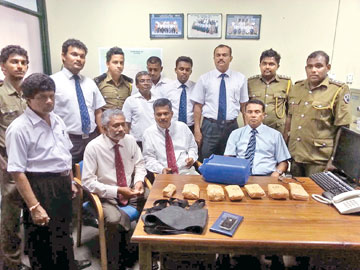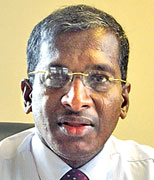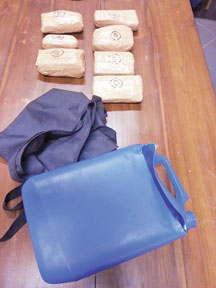|
Navy thwarts largest gold smuggling attempt:
Customs beef up surveillance
By Kurulu Kariyakarawana
|

Officials at the Jaffna Customs Unit who are conducting
investigations
|
The smooth waters off the coast of Jaffna were ruffled - a dinghy was
moving rather suspiciously in the smooth waters giving the Sri Lanka
Customs the opportunity to make its hundredth detection in Jaffna.
The cooperation of Customs officials who were advised to increase
surveillance and intelligence in busting gold smugglers is at a high
level as the rewards made to officials who lead to successful detections
are also high. The officer who makes the detection would get a cash
reward of one third of the worth of the detected goods plus the fine
imposed on that.
The Sri Lanka Navy Ship Ranadheera which was on surveillance duty off
the coast of Medagalthurai noticed the dinghy operating in a suspicious
manner on Wednesday evening. When the boat was intercepted the sailors
found two men in the boat who responded to queries in a rather queasy
manner thus arousing he suspicion of the navy personnel. A quick fire
decision was taken to search the fibreglass dinghy and to their utter
bewilderment, they found a large stock of gold carefully concealed in a
plastic fuel can.
The Sri Lanka Navy on October 1 thwarted the biggest ever attempt to
smuggle a stock of gold out of the country. The contraband weighing 45
kilograms, which was handed over to the Sri Lanka Customs as part of the
investigation procedure was also recorded to be the largest ever seizure
of gold in the history of the Customs. The value of this stock of seized
gold amounts to a staggering at Rs.204.5 million.
In other words, the stock weighs five kilograms more than the entire
stock of gold seized by the Customs in 83 attempts to smuggle gold out
of the country, since January first of this year..
|

Customs Spokesman Director Leslie Gamini |
The Customs is one of the leading law enforcement authorities that
man and monitors seaports and airports to detect smuggling of goods.
Apart from narcotics, counterfeit currency and other valuable goods,
gold is a prominent item which is being smuggled in and out of the
country through these ports every year. With this latest detection by
the Navy, which apprehended two suspects, the Customs completes its
hundredth case of seizure of gold this year to date. According to
Customs statistics 83 instances of attempting to smuggle gold and gold
jewellery out of the country had been detected since January 1 and the
entire stock so far seized weighs 40 kilograms and 53 grams. This single
detection has outweighed this amount by five kilos as well.
Likewise the Customs conducted 16 cases where attempts to smuggle
gold into the country were thwarted and recovered 45 kilograms and 52
grams valued at Rs.239 million. Most of these 99 cases were detected at
the Bandaranaike International Airport in Katunayake and eight of the 16
cases detected were with regard to passengers arriving and what is
astounding is these detections are for he solitary month of September.
The Navy took the two suspects into custody and seized the gold
including the fibreglass dinghy, Suzuki 9.9 horse power outbound motor,
a fishing net and a GPS Garmin 72H used to navigate the trip. The
suspects along with the goods and the contraband were handed over to the
Deputy Director of Customs in charge of Kankesanthurai, Jaffna O L S
Ismath. The Customs checked the goods and found over 50 pieces of gold
slabs and biscuits in various sizes. These slabs weighed from 50 grams
to 200 grams each. The slabs had been covered in polythene and inserted
in the fuel can through its mouth. The stock is valued at Rs.225
million.
Initial investigations revealed that the two suspects who were
reportedly residents of Medagalthurai area and had tried to smuggle the
gold to India. Several others engaged in the illegal trade of gold in
Jaffna had supported this attempt. However, a couple of days prior to
this detection the Navy seized another boat transporting a stock of gold
weighing one kilogram and 730 grams in the same coastal area.
As mentioned before there had been eight instances in the last month
alone where individuals tried to smuggle in gold in small amounts hidden
under various means. In most cases the arriving passengers had concealed
the gold slabs or biscuits in their rectums.
|

The plastic fuel can used to conceal the stock of gold slabs |
On September 8, 2013 The Sunday Observer exposed the growing trend of
smuggling gold hidden in the rectum. In the story headlined “Quaint
methods adopted to avoid detection” we mentioned how “the rectum is used
to smuggle gold out of the country. Depending on the items, smugglers
hide it in their baggage, in false bottoms, in clothing, in footwear and
inside the body where some of them swallow narcotics which can be
retrieved when passing faecaes. The rectum is the latest modus operandi
to smuggle valuables”.
Customs Spokesman Director Leslie Gamini said that of late there was
a rise in detections regarding smuggling of gold. . According to
Director Gamini individuals mostly males, use numerous ways to smuggle
gold in and out of the country.
They hide the contraband in their baggage, in false bottoms, some in
the rectum and females in their person and in some rare cases the
individuals had even swallowed small amounts of gold.
Smugglers are shrewd and want to take the contraband undetected so
they try ingenious methods to prevent detection and fool Customs
officials who are equipped with state- of -the- art scanners and x-ray
machines as well as having mastered in observing a culprit, with their
specially trained skills to detect a smuggler. Whatever method is
adopted by smugglers, Customs officials have found ways and means to
detect contraband attempted to to be takenr out of the airport.
However, smugglers do seem to have invented new ways of carrying out
their modus operandi over the unsuspecting nose of the law enforcement
authorities every now and then. This was proved with the two recent
detections made at the Bandaranaike International Airport, where
smugglers had sought the assistance of airport staff to bring in gold
without being noticed. An employee attached to a duty free goods shop
and a member of the ground handling staff were used as carriers of the
contraband as a rule they would never be subject to search by the
Customs. A couple of weeks ago, the Customs at the BIA was alerted by
the Airport and Aviation Security about the suspicious movements of a
duty free shop employee. Customs arrested the man and found two parcels,
each containing 10 biscuits of gold, carefully wrapped around his thigh.
The sales assistant on questioning disclosed that he was given the
two parcels of gold by two local passengers returning from Dubai to be
carried out of the airport.
He was given the parcels by the arriving passengers in the toilet in
the arrivals lounge before entering the Customs gates. The Customs
officials who acted swiftly arrested one of the passengers, along with
another man who had come to the airport to receive the package of gold
worth Rs.10 million.
A few days prior to this incident a member of the BIA ground handling
staff was apprehended by the Customs for trying to smuggle in two
biscuits of gold.
Customs officials were alarmed by this detection as that was the
first time an airport official had been used to carry gold into the
country avoiding the Customs gates.
Director Leslie Gamini said that Customs officials at the BIA were
given specific instructions to beef up surveillance and intelligence to
monitor such attempts being made by smugglers to use employees of the
airport to carry illicit goods through their designated search free
entry and exit points.
Through out history passengers tried to smuggle gold in the form of
jewellery, as gold biscuits of the standard sizes, as semi finished and
unfinished jewellery. Gold can be imported or exported from the country
without a tax and according to the Exchange Control Act. However, if a
person is carrying gold which is more than what a bona fide passenger
ought to carry, that person has to declare the amount of gold to the
Customs.
Another method used by the suspects on many occasions was to carry
semi finished or unfinished gold, wearing it on their person. These semi
finished gold items will be taken to India and sold with the intention
of buying goods such as expensive saris, which passengers bring into the
country on their return. According to Customs statistics most of the
passengers carrying gold had come to Sri Lanka from Dubai and Singapore
and most of the attempts being made to take gold out was to India.
So in other words, Sri Lanka had been used as a transshipment hub to
import and export gold through illicit channels.
This had caused a grave situation as the Treasury had failed to state
the actual amount of gold reserves in the country when preparing the
budget. Apart from the legal reserves of gold being entered in the books
an unknown quantity frequently enters and exits the country, Director
Gamini said.
The seized of gold will however be sold at a public auction after one
month from the date they were detected. One month will be given to make
an appeal by anybody who could claim rights to that seized gold.
Sometime back such seized gold was handed over to the Central Bank but
now the Customs will sell them at an auction and the revenue will be
paid to the Government.
For example if a batch of gold worth Rs.10 million is seized 50% of
that value will be paid to the government as revenue. Out of the
remaining half, 60% will be paid to the informant or the first officer
who detected the goods.
The remaining 40% of the second half will equally be divided among
the other Customs officials from the rank of Superintendent to the
lowest position, the labourer or office assistant of that unit.
In a massive detection like in Jaffna where the goods were valued at
over Rs.200 million, the lowest Customs labourer would even get his
share of reward amounting to several hundred thousand rupees.
This will encourage them to maximise performance and commitment in
recovering illicit gold, the Director said. |

